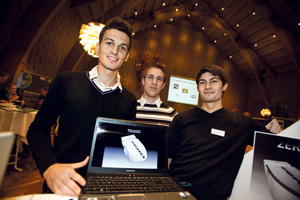
By David Vranicar
dav@adm.au.dk
They never thought they would know so much about toilets.
They are, after all, business students. One of them has a Bachelor’s degree in Business Administration. Another is an expert in online marketing. Another is working toward a Master’s of Science in Management.
Yet here they are, waxing eloquent about water bowls and waste, siphons and sewer lines. Not that they brag about their newfound expertise.
“It’s not the best topic to talk about,” says Italy native Valentino Giudice. “It’s not the best thing to talk with friends about.”
“I am not so proud of it,” adds fellow Italian Manuel Nasti, who, along with Hungarian Janos Perei, can answer any of your questions about bacteria accumulation.
Most business students probably don’t expect to become fluent in toilet talk. But these three – along with Aarhus School of Business classmates Indira Pérez Alvarez (from Mexico) and Anders Brusgård (Denmark) – have expanded their vocabulary because they are bent on changing the way the world thinks. Or at least how it flushes.
It’s called the Zero Water Consumption Toilet, or “Zero,” and it’s an idea that combines new-age technology, market demands and, yes, bodily functions. The international quintet hopes to use their various backgrounds in business – and their budding knowledge of toilets – to turn Zero into a product that penetrates markets (and bathrooms) around the world.
Remaking the toilet starts with nanotechnology, which utilises innovations on the atomic level. Nanotechnology is currently used for things like paint, sunscreen and self-cleaning windows. But while working on a water conservation project, Giudice wondered if nanotechnology could be used on a toilet.
“I tried to come up with a totally new kind of concept for the toilet,” he says.
And the concept is this: Line the inside of a toilet bowl with a nanotechnology-based material that, because of its molecular make-up, sheds all material upon contact. Nothing sticks to it – not chocolate, not oil, not human waste and, as Nasti is quick to point out, not bacteria.
Coated with this space-age product, a toilet bowl would no longer need water. Anything that goes in would simply slide down the sides of the bowl and into the tank.
“It’s a material that creates a super-smooth, non-stick surface,” Giudice explains. “That means that any kind of waste that goes inside, it doesn’t get the toilet bowl dirty. It just slides.”
While the toilet bowl requires no water, Giudice and company still had to devise a way to get the waste to the sewer. To do this, they will use “grey water,” which is water recycled from the shower and sink.
The grey water will be funneled from the drain into the Zero water tank, where it whisks away the waste.
The Zero toilet works just like a regular toilet, save that the fresh water consumption is zero. Hence, the name.
While they are now quasi-experts on all things toilet, the members of the Zero group still have their roots in business. And the economics of water make them confident Zero has international marketability.
Giudice says that flushing accounts for 30 percent of a household’s fresh water consumption. But with a Zero toilet that number would plummet to zero percent, which according to the group would save one four-person family 4,000 litres each month.
At present water prices, a Zero system would save a few hundred Danish Kroner per month – an admittedly small number, but one that the group is certain will rise.
“The (fresh water) reserves are running out,” Perei says. “And the price of water will be increasing. On the short-term you might not realise such an impressive gain, but if you start to use these systems over the long-term – 15, 20 years – then you will be able to capitalise on this kind of investment.”
Truth be told, there are still issues with the Zero Toilet. For starters, it only exists in theory, confined to drawings, powerpoint slides and the minds of those who dreamt it up. And Perei admits that there could also be logistical issues matching Zero to some plumbing systems.
But the members of Zero are undeterred. They are promoting their product at various events, such as the Venture Cup, which is an idea competition that brings together entrepreneurs like Zero and investors looking for the next big idea.
And the members of Zero are confident that they have a big idea. Why else would they have bothered to learn toiletese?